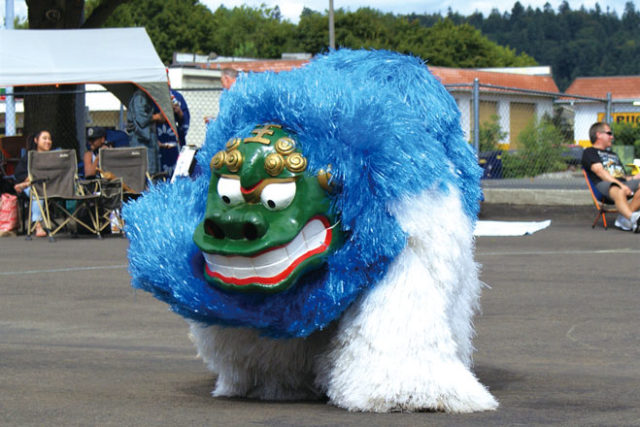
By Chinami Daima
The North American Post
As summer festival season continues, Japanese taiko performances can be seen at many occasions. Okinawa Kenjin Kai Chijinshuu is one of them, from which come relaxing and powerful rhythms of Ryuku music, the traditional music of the Okinawa nIslands.
Marking its ninth year, Okinawa Kenjin Kai (OKK) Taiko club changed their name last month as “Okinawa Kenjin Kai Chijinshuu” named after its parent organization “Chijinshuu Wakatida” in Urayasu city in Okinawa.
The club members are from all around the Puget Sound including Olympia, Tacoma and Oak Harbor. They do not have to be related to Okinawa in order to join as a Chijinshuu member. According to the club, the Oak Harbor area has dozens of members but only one person is from Okinawa.
There is a term from Uchinaguchi, Okinawa language, “Icharibacho-de,” which means, “if we meet once, we become brothers.”
“If you need any help, don’t hesitate to ask help because we are brothers and sisters,” said Mia Slattum, coordinator of the OKK Chijinshuu.
Slattum recalled that she was not interested in Okinawan music until she was invited to the local Okinawa Kenjin Kai meeting. Later, she became a vice president and reorganized the taiko group after repeated dissolution in the decades of the prefecture’s club history.
Wanting to contribute to her home-island, Slattum founded the taiko group nine years ago.
“I am now excited and like to hear Okinawa music,” she said.
Taiko practice is usually held once a month at the Asia Pacific Cultural Center in Tacoma, but it is hard for all members to join together at once. According to the club, at least a few members from each area are asked to attend the practice while others can learn the movements from online videos.
Their performances can be seen in various summer festivals and school and community events in addition to Seattle Mariners’ Japan Night with a variety of Okinawa traditional entertainment such as taiko, sanshin, dance and lion dance.
The current membership is 58 from age three to over 80 years. Children learn how to hold sticks by older students while senior dancers teach movements to the next generation. “Fe-shi” (calls) flew back and forth on the practice ground across generations.
“Two years ago, I saw the OKK taiko performance and so impressed,” said Evan Yanagida, who graduated from university last year.
Now he and Namiko Miyazato, an exchange student from Okinawa, are the practice leaders. While practicing, Uchinaguchi, Japanese and English mix together. To organize the group from children to seniors seems hard, but both say, “It is fun.”
During practice they teach delicately and deliberately, but when it comes to performances it is powerful and overwhelming.
Yanagida and Miyazato will instruct the club’s new practice session at the Japanese Cultural & Community Center of Washington from this month. The Taiko lessons will open every second and fourth Monday at 5 p.m. More information and memberships can be found through miaslattum@yahoo.com.



